Film Music Editor: Ian Lace |
||
November 1999 Film Music CD
Reviews |
|
|
Return to the November Index with thumbnails [ Part 1 ] [ Part 2 ] [ Part 3 ] [ Part 4 ]
************************************************************** EDITOR’S RECOMMENDATION – November 1999
**************************************************************
Composed, Arranged, and Conducted by Anne Dudley
ANGEL 7243 5 56868 2 4 [61:00]
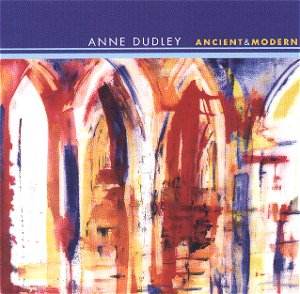
Anne Dudley, best known for her work with The Art of Noise and to filmusic fans for her [some might say scandalous] Oscar win with "The Full Monty," enters the classical arena with this effectual debut album of reinterpreted carols, chorales, and hymns. In doing so, it sounds as if Dudley brought forward every Thespian force she has at her disposal.
The track selection alone is incredible. It can be a joy to hear new things, but it can be equally joyous to hear old things in new ways! With excerpts of J.S. Bach, Thomas Tallis, and several traditional English melodies, there is no shortage of variety and technical, emotional, or theological depth to the compilation's listing. Dudley's orchestrations are nearly as impressive: She turned the unforgettable Sussex Carol into a canzonetta for string quintet that left me wanting more. She transformed the already mysterious 'Tallis' Canon' into a symphonic work with sincere, bold, dramatic concentration. She took Bach's Prelude in B-flat minor and arranged it as an extremely listenable essay for double reed quintet. And more. The album succeeds in both sacred and secular senses as 'a great noise.'
Some uncomfortable moments remain, but these mostly center on repetitive, soporific, generally synthesized musical undercurrents. Fans of minimalism may enjoy the inventiveness, but those who feel minimalism is a bit, well, minimal will discover tracks that are most certainly hard going. (The Steve Reich motivated adaptation of 'The Holly and the Ivy' may leave some listeners wanting to drench the ivy in Roundup and chop down the holly once and for all... I had to fight that urge myself.)
The sound is frequently resonant, the performances from orchestra, choir, percussionists, et al are commanding, and the sleeve notes (song texts and a short Anne Dudley biography) help add to one's perspective of what went into this disc. The album production is uniformly tiptop.
Victorian author Thomas Carlyle once wrote, "Music is well said to be the speech of angels." Taking Carlyle's words at face value, I venture to add that Dudley's angelic muse must speak very eloquently.
Reviewer
Jeffrey Wheeler

************************************************************** EDITOR’S RECOMMENDATION – November 1999
**************************************************************
OST
FILM SCORE Silver Age Classics FSM Vol. 2; No. 6 [47:45]
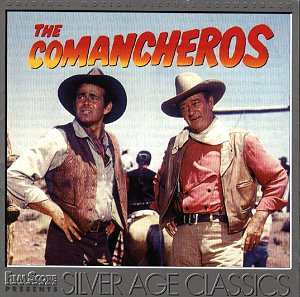
I have to confess that I have some sympathy with Nik Redman’s rather gloomy view of current cinema as he sees it in his introductory notes to this smashing album. He deplores the position of today’s filmgoing as "bottom-of-the-cultural-barrel." Looking through the new scores we have had to review on this site this year, and the standard of films coming into our theatres, I feel there is some justification for this viewpoint. Once again, it is the top few composers: John Williams, Jerry Goldsmith and Elmer Bernstein that impress with all the others generally lagging some way behind. (Yes, I know there have been a few exceptions like: Simon Boswell’s A Midsummer Night’s Dream, Hans Zimmer’s Thin Red Line and Randy Newman’s Pleasantville, but there were few others as worthy as these.)
The Comancheros, one of the last films to be directed by the legendary Michael Cutiz, was not a brilliant western but it was admirably crafted with good performances from a cast led by the Duke, John Wayne, brilliantly photographed by William H. Clothier and superbly scored by Elmer Bernstein.
The album comprises 20 selections from the original soundtrack gloriously restored in stunning sound, plus the usual absorbing bonus tracks that we have come to expect from the enterprising Film Score Monthly team. There is the unused title song "The Commancheros" sung by Claude King. It is a folksy ballad that commentates on the plot of the film and includes some politically incorrect "Indian" war calls. Then there is another ballad "You walked away" which was never released, but used for the lovelorn gambler Paul Regret (Stuart Whitman) as he pines for Pilar Graile, daughter of the renegade Comancheros leader. A final bonus is an absolutely riveting mono mix of the film’s main title with Jake’s theme thrillingly prominent.
It is this main theme for Wayne’s character, Jake Cutter, which lingers in the memory. This is surely the most appealing western theme Bernstein ever penned, even more memorable, for my money, than that for The Magnificent Seven. This superb theme is typical of Bernstein’s virile muscular score and it is developed and used throughout the film. There are many impressive cues. ‘Riverboat Capture’ is a complex cue weaving in character and narrative musical comment, with the odd touch of rye humour. A nice feature of this cue, that is also carried over into the next track, is the stealthy tambourine figures that might suggest jingling spurs. In ‘The Wide Open’ (and later in ‘Nostalgia’), Bernstein introduces slower, string-based romantic material as Jake reminisces about his late wife and the ranch he once tended. ‘Eulogy carries some impressive muted Indian music as the heroes sight a burnt-out ranch and its murdered occupants; and a tender section for solo strings over woodwinds underscore Jake’s discovery of the body of an elderly woman and evidence of a murdered child. In ‘McBain’, Bernstein gives us a jaunty piece of Coplandesque Americana as Jake takes on McBain’s identity (and his wagon of guns) to pursue the Comancheros. ‘Attack’ has strong pulsating rhythms for the Comanches attack. ‘Commancheros’, one of the strongest tracks on the album, reprises Jake’s theme strongly, declaims the romantic theme passionately and stages realistically fierce Indian war figures. The "Indian" music is particularly imaginatively scored and orchestrated, avoiding the usual clichés. Finally, I would just mention the catchy Latin music for ‘Campfire Dance.’
Maintaining Film Score’s high standards, the booklet is excellent with plenty of stills from the film, Nik Redman’s informed background notes about the production of the film, and informed, intelligent track-by-track analyses by Jeff Bond.
Another triumph for Film Score Monthly and enthusiastically recommended.
Reviewer
Ian Lace

"For further information visit Film Score Monthly - www.filmscoremonthly.com and see the magazine Film Score Monthly for exciting news on upcoming releases."
Music for the TV film conducted by the composer
PROMETHEUS PCR 503 [47:20]
[We are ahead of the game here. No Internet store seems to stock this title yet]
Save around 22% with
Crotchet
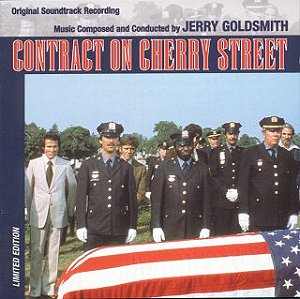
If you were a teenager in the 70's, discovering film music through the great Jerry Goldsmith scores of the decade, such as Chinatown, Papillon, Logan's Run, Capricorn One and Alien, and now after 20 years found this CD on your doormat, you just might think Christmas had come early. Contract on Cherry Street was a 1977 TV movie, the last such that Jerry Goldsmith has scored to date, and the last of the six scores he wrote in 1977. Chronologically it comes immediately after Goldsmith's own favourite of all his scores, Islands in the Stream, and just prior to an astonishing 1978, in which he would create exceptional scores for Magic, The Boys From Brazil, The Swarm, Coma, Capricorn One and Damien: Omen II. This, previously unreleased score comes, therefore, from the very heart of Goldsmith's most inspired period as a film composer, when he delivered such a continuously prolific river of great scores that many of us then probably took his genius for granted. Here, in this music for a virtually forgotten TV movie, is yet one more opportunity to appreciate the distinctive qualities of Jerry Goldsmith's music, circa 1977.
Contract on Cherry Street was exceptional for a TV production, in that it stared Frank Sinatra in his first TV role, and had production values more usually associated with a feature film than the small screen. The booklet informs us that the film falls into the 70's vigilante/cop movie cycle popularised by Dirty Harry, The French Connection and Death Wish, telling the story of a New York cop, Frank Covanis, who takes on the Mafia when his partner is murdered by the Mob. Jerry Goldsmith appears to have approached the drama just as he would had it been intended for the big screen, with a powerful, driving and biting score, which 1970's TV speakers could not possibly have done justice to. While it would be good to see the film now and hear how the music sounded, the original master-tapes were clearly superbly recorded, for this album release sounds absolutely marvellous. The stereo sound is clear, full and detailed, and has an immense vibrancy and sense of presence. It puts many other soundtrack recordings from the same period to shame.
But what of the music itself? This is Goldsmith pared-down, lean and gritty and hard-bitten, taking a line between the intensity of the suspense music from Papillon and prefiguring the pulsating rhythmic drive of Capricorn One. This is music that, from the 'Main Title', introduces us into an unsettled, restless world of constantly shifting menace. The devices are familiar; the atonal piano, the staccato brass, precise percussion and incessant strings, giving way to a love theme not dissimilar to elements of Chinatown and Logan's Run. Here is the architecture of a nightmare world, for this is music with a real sense of space, of structure and design. Music which is deliberate, as intricately woven as a spider's web, as crafted to a similarly deadly a purpose. Respite comes after the opening suspense sequences, as 'Equal Partners' offers a melancholy reflection, presumably on Covanis' dead colleague, but with music which could be an eloquent love theme in the more conventional sense.
Many of the cues are quite short, but nevertheless work well as self-contained piece of music, while apart from the 'Main Title', 'False Arrest', 'Eulogizing', 'One Way Ride' and 'Breach of Contract' each allow for considerably fuller development. 'False Arrest' is a textbook example of building suspense over an extended scene, while 'Eulogizing' is a string lament with undercurrents of especial darkness, giving way to a jazz treatment which pre-dates 'Twin Peaks' by over a decade, ending as a fine variation on the love theme. 'One Way Ride' is initially understated, the following savagery all the more powerful for the previous restraint. 'Breach of Contract' provides a more emotional resolution to the drama than might be expected, with a forceful conjoining of suspense and more heartfelt music, leading to the jazzy resignation of the 'Finale', a touch immediately familiar from Chinatown, and more recently, LA Confidential.
It would be easy to praise this disc just a little too highly, simply because is so good, and because, after over 20 years, it finally makes this powerful score available. Certainly for serious Goldsmith fans this release is an essential purchase, and an invaluable addition to any collection of the composer's scores, but what it is not is a document of a previously lost masterpiece. This is certainly excellent Goldsmith, but it is not one of the composer's absolutely great scores. More casual listeners may find that having music from other scores by the composer from this period means that while the album is very desirable, their money would be better spent on acquiring one of Goldsmith's real classics. Nevertheless, this is a truly exceptional release, and comes thoroughly recommended.
Reviewer
Gary S. Dalkin

Complete soundtrack from the film. MGM Studio Orchestra and Chorus Miklos Rozsa.
Rhino Recordings R272197 2 CDs.
.jpg)
The race goes on Judah.......it goes on.....it goes on
Words fail to describe the impact this unique film makes on me every time I watch it. Scores of times, it has held me glued to the screen, crying, laughing, shouting, all types of human emotions are traversed when watching such an incredible film. It has everything, palpitating drama, spectacular action scenes, tender love episodes and sheer passion, and through all this lies an undercurrent of some of the most effective music ever written for the screen. Rozsa’s mammoth score is finally available in all its completeness, an enterprise that has eluded me until only recently after almost 20 years of my love affair with this blockbuster.
Rhino’s packaging is superb, a worthy effort in enshrining this magnificent score for posterity. Brief popular excerpts have been available sporadically, I own a superb sounding Phase 4 Decca LP of a forty minute suite that has been my main reference point in the past years but this surely takes the cake for completeness. First of all, the sound is eminently acceptable, not the dull recessed sound that mars Capitol'’s official soundtrack with Carlo Savina and the Rome Symphony Orchestra. This lavishly packaged two disc set includes over eighty tracks, complete with outtakes and discarded bits and pieces and follows the logical pattern of the film.
So, after an enthralling Overture with harps and trombones in full cry you are treated to a sit-in on Rozsa'’s thoughts in the most intimate manner. The horn call that leads to the Prelude is another case for rejoicing, the sense of exhilaration that that change causes makes Micelangelo come immediately to mind. The extensive love themes are given the full treatment whilst the heart-stirring music from the Burning desert includes that magical transition when Christ gives Ben Hur water, followed without a break by the Galleys music another piece faithful to the actual reel. I don’t need to go into much detail about Rozsa’s unique score, it is humanity personified. The most memorable bits such as the Chariot race, the Valley of the Lepers, Return to Judea, Love Theme, Friendship and the exulting Miracle and Finale are all here and some little joins and tantalizing excerpts make this issue a coveted prize for the Ben Hur enthusiast.
My sheer enjoyment in discovering these long lost excerpts was unbound although the music does occasionally stop in its tracks, lasting less than a minute. The whole enterprise oozes class throughout with lavish notes and rare on-site photographs in a beautiful book-like case, this is the way film scores should be produced! After such a long wait, this is cause for celebration. ‘A Tale of the Christ’ has finally come home.
Reviewer
Gerald Fenech
Performance:
Sound:

INTRADA
The Lighter Side, vol. 1 CD 4001 [ 45:36]
Sounds Exciting, vol. 2 CD 4002 [ 50:03]
Musical Drama, vol. 3 CD 4003 [72:42]
Double Feature, vol. 4 CD 4004/5 [ 98:31]
Save around 22% with
Crotchet[not yet in any web-store]
These four albums (five, if one considers that Double Feature is a 2-CD set) survey some of the scores by Bruce Broughton, a composer of recent vintage, who often comes across as one of the most eclectic and inventive purveyors of film music of his generation.
For those who may not be too familiar with him, Broughton, born in 1945, began in television in the 1980s (he notably won an Emmy for his music for Dallas, in 1983), before moving to feature films where he particularly distinguished himself with such scores as Young Sherlock Holmes, Silverado, Harry and The Hendersons, and more recently Lost In Space.
Unlike many other relative newcomers to the field of film music, Broughton knows the values of a good melody, and his scores frequently display florid examples of a style that is at once evocative of the screen action and catchy when removed from it. Don't expect the standard contingent of synthesized sounds that meander helplessly (and one would say, hopelessly) in search of a hook so prevalent in most of today's efforts; instead, Broughton serves up solidly crafted tunes that are pleasantly listeneable, and make his scores usually much sought after by connoisseurs.
The four volumes released by Intrada provide a compelling overview of his career up till now. Generally speaking, this is a very interesting series which includes themes from the major films with which the composer has been associated, many others that are available for the first time, and some unexpected discoveries
Be aware, however, that on close examination some flaws are readily apparent that could have been dealt with and corrected in order to maximize the impact and importance of these releases. For instance, one could quibble with the thematic concept which, while somewhat loose, denies a greater sense of continuity throughout the various volumes, and sometimes within a single volume: the apparently random compilation of selections from films as diverse in format and importance as Silverado, So I Married An Axe Murderer, Narrow Margin and Night Ride Home somewhat diminishes the effectiveness of a CD like Double Feature, and leaves one wondering what prompted producers Broughton and Douglass Fake to assemble these the way they have. The arbitrary subtitles given each CD don't help much either, as one is bound to remark that they seem to ill-suit the selections under their generic umbrella. Equally baffling in some CDs is the abundance of some tracks from a single film at the expense of a better balance: for instance, Sounds Exciting features five selections out of 13 from Narrow Margin, a score that probably didn't deserve so much coverage, when a greater diversity might have served the bill just as well.
Much more satisfying, in that respect, is Musical Drama which is split into two distinct sections, Drama and Adventure and Fantasy, both of which consist of themes that belong in these respective categories. But why, when you have a two-CD set like Double Feature, not fill it a bit more to accommodate the longer playing time? As it is, the first CD in that set clocks in at 62:45, but the second only contains 11 tracks with a total playing time of 35:46. Would have it meant a great deal more to add a couple of selections and make this second CD a little bit more rewarding?
As its title indicates it, the first CD, The Lighter Side, deals more specifically with the comedies for which Broughton has written some of his most engaging scores – Honey, I Blew Up The Kid (1 track), House Arrest (2 tracks), Krippendorf's Tribe (2 tracks), Big Shots (1 track), Baby's Day Out (1 track), and So I Married An Axe Murderer (1 track). However, the big surprise here, at least to these ears, are the five selections from the Tiny Toon Adventures: taken singly or collectively, they would make Carl Stalling (or even Raymond Scott) proud. More than any others, these reveal Broughton's versatility and innate sense of fun, and probably stand out as the highlights in the entire collection.
Under the umbrella subhead Sounds Exciting, the second CD regroups selections from a wide range of films, including five from Narrow Margin, two from The Presidio, and one each from Glory And Honor, Shadow Conspiracy, Silverado, Young Sherlock Holmes (a score that should have called for a greater amount of excerpts), Tombstone, and the television action drama, J*A*G*. Of those, surprisingly perhaps, "Train Fight" and "Choppers and Rails," both from Narrow Margin, come off best and most suggestive of the kind of action cues Broughton can create. But "Trek On The Ice," from Glory And Honor, sounds like a throwaway in the context rather than an inspired choice.
As mentioned above, Musical Drama is divided into two distinct categories, Drama, with eight selections, and Adventure And Fantasy, with 12. Of the two, the latter is much more inviting, with varied choices from Harry And The Hendersons, Lost In Space, Young Sherlock Holmes (all with one track), A Simple Wish (three tracks), Kippendorf's Tribe, The Monster Squad and Glory And Honor (each with two tracks), making the best impression. Drama, on the other hand, while attractive in its own way, presents so-so selections from films like The Presidio, Night Ride Home, One Tough Cop, Infinity, and Big Shots, whose overall impact seems a little bit more limited.
The 2-CD Double Feature draws from essentially the same films, with Rescuers Down Under, Last Rites, Homeward Bound, Jacknife, Betsy's Wedding, For Love Of Money, True Women, Miracle On 34th Street, and O Pioneers! among the films represented here with tracks not found in the other three CDs. But again, while one can only welcome the abundance of selections assembled here, the nagging thought is that these were put together in a random manner that paid little attention to program continuity.
Taken together, however, they show Broughton's richness of invention and natural proclivity, and ultimately prove musically engaging and enjoyable.
Another criticism: in view of the pain and obvious effort that went into putting these four CDs together, it seems regrettable that Intrada didn't see fit to provide appropriate booklets, with some text to illustrate the work done by Broughton, some biographical data, and, why not?, a plug for the label's own full recordings of Broughton scores: all that's available is a single tray card, the obverse of which contains only a blurb that means strictly nothing for the connoisseur, and even less for the occasional buyer possibly intrigued by some of the selections included therein. This casual oversight demeans what would have been otherwise an absolute delight!
Reviewer
Didier C. Deutsch

OST
SUPER TRACKS STCD 881
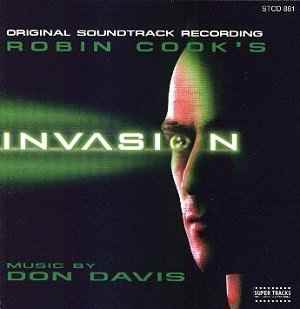
Oh boy ! Just how will the planet react if we ever actually were over-taken by alien forces. It'd be nice to think there'd be the underground resistance that saves the day. And it'd be nice to think there'd be a patriotic anthem for their bravura. Just for a change though, wouldn't it be nice of the victory was less assured ? And for the anthem to be held in check in favour of something a little more unpredictable on the ear ?
If you've been Independence Day'd out, this might be more to your liking. Especially if you go for the stylistic approach to TV sci-fi music of Christopher Franke's Babylon 5. Davis has more recently scored Universal Soldier: The Return, and on that a similarity in style and samples could be heard to both Franke's original and the TV space opera. On this album, you'll find the similarities overwhelming. There's even the baddie Shadow motif to be found...
"Main Titles" is a doom-laden piece that real in 3 and a half minutes you have an idea of what to expect for the next 70. The line between electronics and any live instrumentation is hard to divine. The wordless voices that breathe in and out are a nice colour, as is and intriguing piano phrase midway. Something that looks ahead to his breathtaking The Matrix score. The drum loops and metallic scraping have already become familiar before "The Invasion Begins", but as the album progresses there are effective uses of solo child voice and pizzicato strings (think spidery !) added to the palette.
A little contrast can be found in the sadness of "Alien Fumes" with a lovely harp part, but after the "Main Titles" the album's true gem is the 11 minute long "The Mother of All Motherships" - a title that indicates just how seriously to take Davis' music ! Featuring some interesting 'alien' chanting, this is the most melodically interesting cue.
Reviewer
Paul Tonks

Denver Symphony Orchestra and Chorus
PROMETHEUS PCD 144 [72:00]

This score has all the virtues of the fantasy adventure genre score – save one, a really good memorable theme. Granted one such theme tries to emerge from several tracks but what is missing is the sort of Korngold, Waxman, Steiner or John Williams tune that would really thrill your tingle zone.
Davis gives us a polished, well-crafted score. It is heroic, atmospheric, magical, and romantic. It is delivered in style by a large orchestra (the Denver S.O. and chorus). Glorious brazen fanfares, heroic daring-do, darker figures for the evil machinations, misty landscapes, mystical and tender romantic moments, they’re all here. Davis musical characterisation is vivid too, the clumsy lumbering gait of Komodo Dragontrot is nicely conveyed. The influences are many and varied. One can see something of Horner, of Goldsmith. There are touches of the Gallic and Gaelic; Dukas, in his chivalric Symphony mode, is discernible. ‘The Lifespring Rhapsody’ has some captivating romantic interludes and ‘The Wonder of Tao’, a magical cue, almost delivers that memorable theme I craved.
Nevertheless, this is thrilling stuff appealing directly to the eternal ‘little boy’ in most of us.
Reviewer
Ian Lace

Original Televison Soundtrack
SUPER TRACKS STCD 501
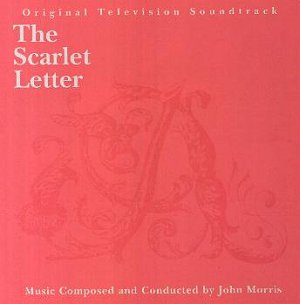
Nathaniel Hawthorne's classic tale has enjoyed several adaptations for screen. This particular TV version hails from 1979, and a time when budgets allowed a composer to employ the likes of The London Studio Symphony Orchestra to realise their creation. The orchestra section that got the most exercise 2 decades ago was clearly winds. There are a huge number of pipes, recorders, and flutes utilised to blow a sympathetic undercurrent beneath the tale (including bagpipes in "The Marketplace")The letter of the title is an 'A' - burned across the skies by a passing "Comet" (wonderful use of multiple harps). When you learn that the bell which peals a tragic toll through the music is in the chord of A, Morris' music encourages repeat listens to pick up the subtle nuances reflecting the action chronicled in the booklet notes.
A very late album - but first class. In fact, I give it an A (groan).
Reviewer
Paul Tonks

We were recently sent a number of PROMOTIONAL soundtrack music CDs to review:-
Promotional Albums offer lesser celebrated film composers the opportunity to bring their work (often of good quality but unsung [if you will forgive the pun]) to the attention of prospective producers who might be interested in contracting them for film scoring assignments. Another market opportunity is for short films, trailers, commercials, and other theatre and TV projects where producers with limited budgets might be interested in buying material "off the shelf." Lastly, film music buffs who have admired the scores but hitherto have never had an opportunity of acquiring the music now have an opportunity of buying scores they have admired. For instance anybody who liked Hummie Mann's music for Mel Brook's farce, Dracula, Dead and Loving It (with Leslie Nielsen) can now buy it from specialist sellers such as
SCREEN ARCHIVES ENTERTAINMENT
P.O. Box 500
Linden, VA 22642-0500
PH: (540) 635-2575
FAX: (540) 635-8554SEND EMAIL TO:
craig@screenarchives.com
or
charles@screenarchives.com
website: www.screenarchives.com
Specializes in soundtracks, and carries some of those scores you just won't find anywhere else.Or
SUPER COLLECTOR
12072 Brookhurst Street
Fountain Valley, CA 92840-2815
Voice: (714) 636-8700
Toll free: (800) 997-2434
Fax: (714) 636-8585
E-Mail: supercollector@supercollector.com
website: www.supercollector.com____________________________________________________________________
Composed and Conducted by Edmund Choi
PROMOTIONAL ECCD-01 [42:14]
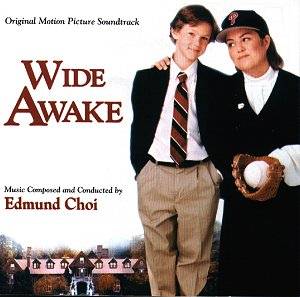
This promotional disc features Edmund Choi's debut studio score to the 1998 family film "Wide Awake," about a Catholic schoolboy in search of life's meaning. The music matches the finest relations to the genre by the likes of Alan Silvestri, Bruce Broughton, and Lee Holdridge.
I say that as one who firmly believes that comedies are difficult to score. Music is not intrinsically funny, so bringing humor up front by way of a full symphony orchestra 'playing it straight' is a fair accomplishment. Dramatic comedies are a greater worry, creating the need for a juggling act between laughs and tears; bad timing can ruin the whole shebang. And children's dramatic comedies are possibly the ultimate composing challenge, for little ears are receptive to anything that rings falsely, and the music must never condescend. Thus Choi achieves what some top film composers never have: filmusic that is light, fun, youthful, yet complex enough to hold the interest of weary adults.
The thematic elements possess a freedom from artificiality, containing broad melodic contours, and buoyant passages. The disc features some solid choral music for The American Boychoir (singing ably, though the enunciation gargles from time to time!), and the soundtrack's themes are extremely sweet. So, one of my peers at another site says the music is obvious. While that may be true, accessibility is always an unwanted creative habit. If 'The Bucket Chase' (the album's clumsiest track) and its explicit nod to "Mission: Impossible" can work, the rest of the score surely does.
I will agree that Mr. Choi could better exploit his dramatic knack. Although well written and entertaining, the music lacks the maturity and intricacies of those for other contemporary family films scored by John Williams, Jerry Goldsmith, Patrick Doyle, Danny Elfman, etc. The large sections of musical naiveté are undoubtedly intentional, but the orchestrations barely avoid making them sound prosaic.
I imagine that many years from now a tough filmusic buff may look at his soundtrack collection and see this disc alongside dozens of other scores by Edmund Choi, the music possibly ripening in technique as time goes by. Everything good about "Wide Awake" sets the right groundwork for it to happen, and if (or when) that happens, what an achievement it will be.
Reviewer
Jeffrey Wheeler

Ian Lace is more enthusiastic:
This is a thoroughly entertaining score and quite an accomplishment. Yes it is derivative. Yes one can detect Bond, Flint and the Mission Impossible material in ‘The Bucket Chase’ and John Williams’s Stanley and Iris and Empire of the Sun in much of this score. So what, there are so many good things here. The boy choir might not be perfect but they sing with spirit and Choy’s settings of the Gloria and Hosanna are appealing enough. Choy’s score for Wide Awake is so tuneful, so brightly and imaginatively orchestrated and heart-warming in its soaring melodies that criticism is disarmed.
Reviewer
Ian Lace

There are more >>>> [ Part 1 ] [ Part 2 ] [ Part 3 ] [ Part 4 ]
Return to November index
 Search the Crotchet database from here
Search the Crotchet database from here
| Discs
on these pages are offered for sale. There is also a page of search
engines from a selection of on-line retailers
here.
Please support this web-site by buying your discs here. Disclaimer: Every effort is made to make sales links to the correct disc but, in the end, you must take responsibility for checking that what you are purchasing is what you want. Some of these discs were not actually available for sale at the time of posting but a link has been made in anticipation of their forthcoming availablility. |
Return To Film Music on the Web
e-mail: info@musicweb.uk.net